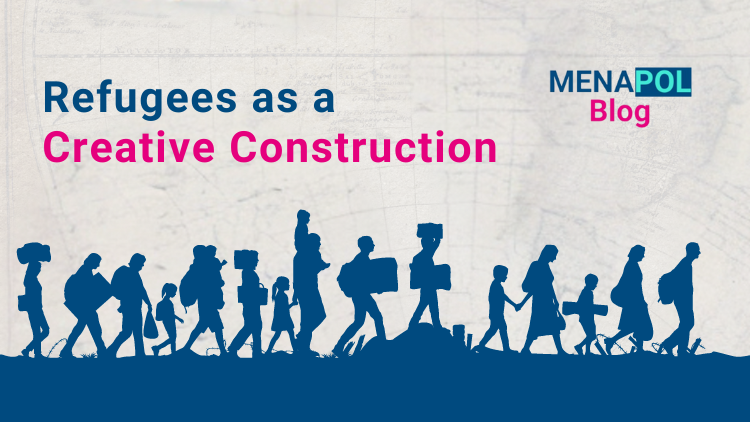MENAPOL Blog
Refugees as a “Creative Construction”

The view that refugees are a burden to a country’s economy should be revised, not based on humanitarian reasoning, but on purely sound economic principles and analysis. Studies on the contributions of refugees (35.3 million worldwide) to their host countries are refuting the “economic burden” emblem usually tagged upon refugees. Moreover, one may rationally view refugees as a demographic and creative boon, which unlike Joseph Schumpeter’s principle of "Creative Destruction", should be viewed as a ‘Creative Construction”.
According to Schumpeter, the “Creative Destruction” concept refers to the process of industrial transformation within an economy that continually changes the economic structure of industries and, consequently, the economy of a nation from within. The old economy is thus constantly destroyed and ceaselessly a new one is created, resulting in economic improvement and expansion. Dynamism arises from within the system itself and its resources. Consequently, in a vibrant economy, employees become employers and entrepreneurs and start to compete with their previous bosses. Within such a system, there are always winners and losers, yet the biggest winner is the overall economy and its prosperity. However, such economic turmoil yields more productive workers, better products, and ultimately higher living standards.
Now juxtapose that to the addition that refugees infuse into a host economy. The influx of refugees brings new human capital, varied experiences, additional investment, and new skills that should be viewed as a gift or a new endowment. Note that the host country has had no initial investment in creating this human or material capital. The host did not suffer the many years of necessary consumption and support required to raise a person from infancy, whereby the person is simply a consumer, into adulthood and the productive phase of one’s life cycle. Nor did the host country incur the cost of training or establish the institutions necessary for the refugee to gain skills or accumulate wealth and business experience; the person simply brought a ready-made skill set with her from her home country, which bore the cost of such developments.
Hence, refugees bring to the host economy what one may wish to call “Creative Construction”. They bring a new stock of intellectual capital, which is the most important input for creating development. They also bring new infusions of creativity that can work side by side, cooperate, complement, and compete with existing organizations and systems. Such creativity may arise from the refugees’ cultural heritage and experiences, which are not available in the host country.
Refugees contribute to the economy of their host as workers, students, entrepreneurs and investors, consumers, savers, and taxpayers. Once allowed to flourish, such an infusion of skills becomes an addition and aid to the country’s intellectual and skill capital. When both host and guest learn from one another, positive externalities (spill-overs) arise. As a result, new levels of creativity, innovation, and consequently competitiveness emerge, which are the underpinnings of development.
A study by the World Refugee Council emphasizes that under open policies, refugees can be an economic benefit to their host communities in the long term as they bring skills to the labour market, utilize technology, and, when allowed, establish businesses that create jobs and bring wealth to the host country. The IMF estimates that the successful labour market integration of current refugees in Europe could boost the GDP of the EU by 0.5% and the GDP of the most heavily impacted host countries (e.g. Germany) by up to 1.1%. Also, a recent study on the economic impact of refugees in the United States shows positive economic contributions and a net gain from refugees beyond the initial cost of settling them over the years.
Moreover, countries that enable their refugees to quickly assimilate within the formal institutional set-up stand to gain the most economic benefits. The principle is simple and similar to that used to justify free competition and open economies (whereby nations trade with each other as if there are no borders). According to a study of ten countries by the ILO, one of those countries, Rwanda, is considered an economic success story even though 25 years ago it was viewed as a failed state. It developed policies that encouraged immigration and interaction of the refugees with the rest of the economy as a means of development. Interestingly, Rwanda had the highest share of refugees (about 16.5% of its immigrant population in 2015) among the countries of the study.
When refugees are integrated into the economy and are allowed to live and work out of encampments and enclosures, the host country's economic gains increase. Furthermore, the security risk they pose is similar, or less than that of the general population. For instance, refugees are less likely to be involved in crimes than the general population.
Why should a country restrict the entry of humans while encouraging the free flow of their goods and services? Adam Smith, the father of modern economics once wrote, “Every man, as long as he does not violate the laws of justice, is left perfectly free to pursue his own interest his own way, and to bring both his industry and capital into competition with those of any other man or order of men”. Smith was speaking in the context of allowing labour to migrate from one geographic space into another. He and others were correct when they said, “Laissez faire et laissez passer,” or “Let them work, let them pass”; for the statement underscores the free flow of labour, entrepreneurship, and capital among nations, and not only goods. So why not accept refugees as an economic boon?